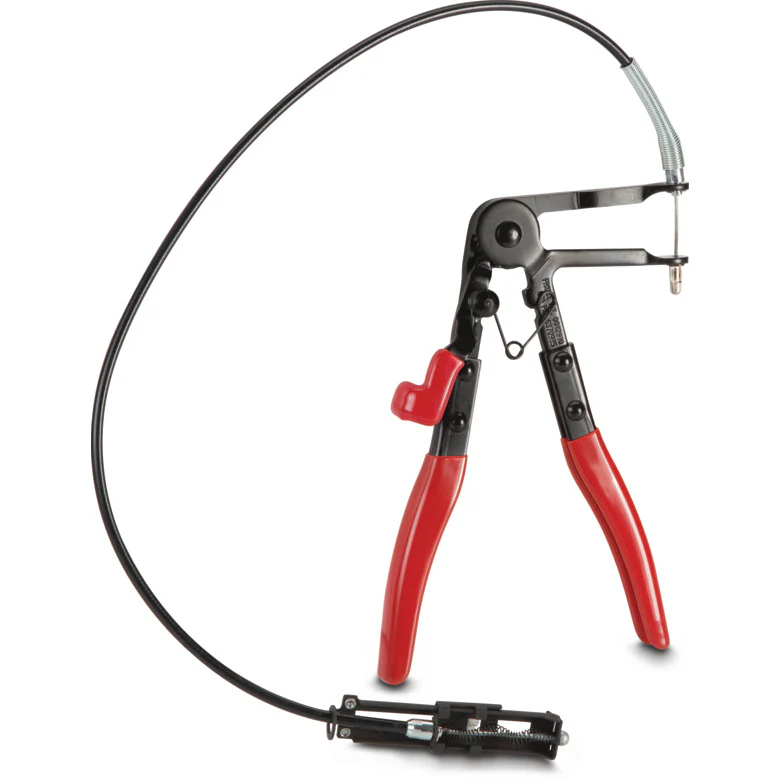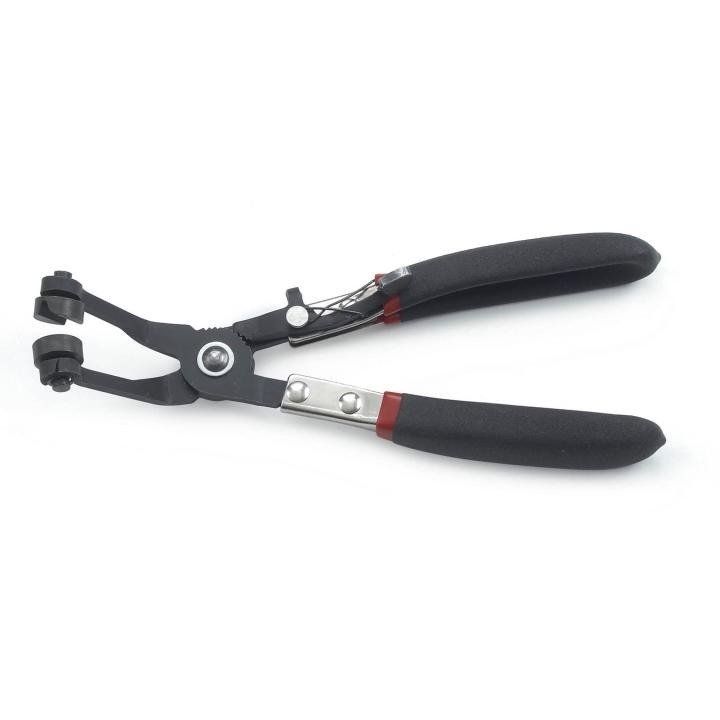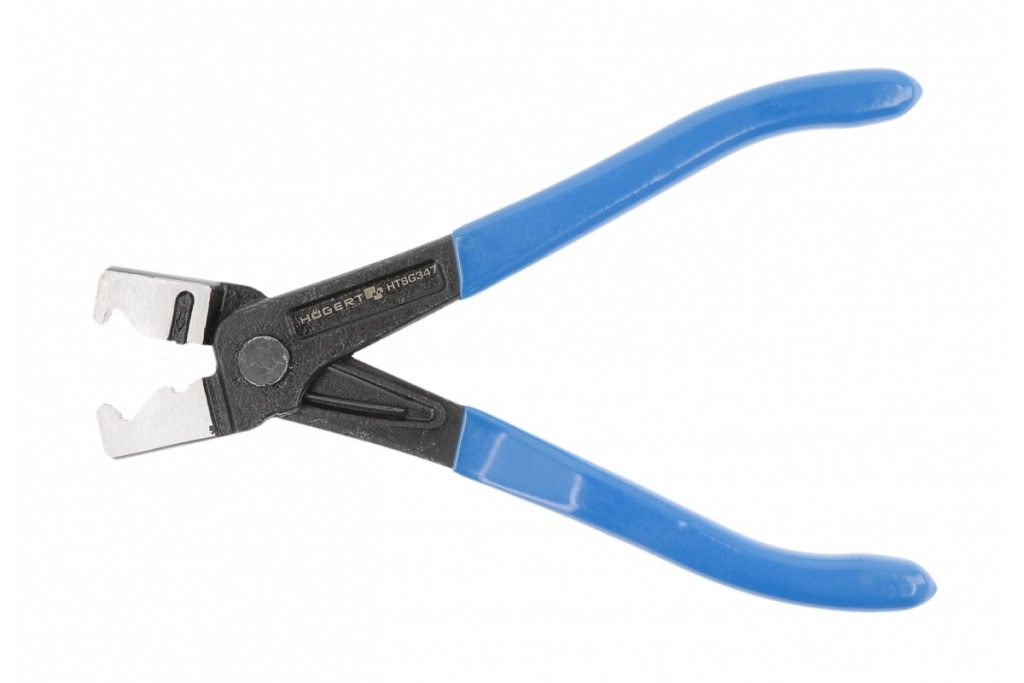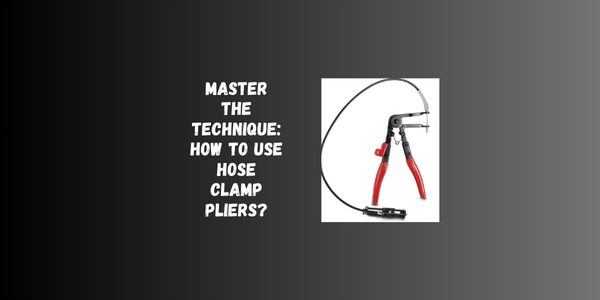To use hose clamp pliers, first, position the pliers around the hose clamp. Then, squeeze the handles to open the clamp for adjustments or removal.
Hose clamp pliers are essential tools for anyone working with hoses and fittings. They simplify the process of tightening or loosening hose clamps, making maintenance tasks easier and more efficient.
These pliers come in various designs, including straight and angled tips, to access tight spaces.
Proper use of hose clamp pliers prevents damage to hoses and ensures secure connections. Whether you’re a professional mechanic or a DIY enthusiast, mastering this tool can enhance your projects.
Understanding how to effectively use hose clamp pliers will save you time and effort, ensuring your hoses function optimally in any application.
Introduction To Hose Clamp Pliers
Hose clamp pliers are essential tools for anyone working with hoses. They make it easy to remove and install hose clamps. These clamps hold hoses securely in place. Using the right tool saves time and effort.

Credit: www.mactools.ca
What Are Hose Clamp Pliers?
Hose clamp pliers are specialized tools. They help manage the tension of hose clamps. These clamps are often found in vehicles and machinery. They can be difficult to handle with bare hands.
Hose clamp pliers come in different types:
- Straight: Good for standard clamps.
- Bent: Useful for tight spaces.
- Locking: Keeps the clamp in position.
Why Use Hose Clamp Pliers?
Using hose clamp pliers offers many benefits:
- Safety: Reduces the risk of injury.
- Efficiency: Speeds up the job.
- Precision: Ensures clamps are secure.
- Versatility: Works with various clamp types.
Hose clamp pliers make tasks easier. They prevent damage to hoses and clamps. Using them leads to better results.
Types Of Hose Clamp Pliers
Choosing the right hose clamp pliers is essential for your projects. Different types serve specific purposes. Here are the main types of hose clamp pliers to consider:
Spring Clamp Pliers
Spring clamp pliers are simple and effective. They are designed to work with spring clamps. These pliers allow for easy opening and closing.
- Easy to Use: They open automatically when you release the handle.
- Lightweight: Made from durable materials, they are easy to carry.
- Ideal for Tight Spaces: Their slim design fits in narrow areas.
Spring clamp pliers are perfect for quick jobs. They secure hoses tightly without damaging them.
Click-r Type Pliers
Click-R type pliers are advanced tools for hose clamp removal. They feature a locking mechanism for safety and ease of use.
| Feature | Description |
|---|---|
| Locking Mechanism | Keeps clamps open for hands-free operation. |
| Adjustable Jaws | Fit various sizes of hose clamps easily. |
| Comfort Grip | Reduces hand fatigue during extended use. |
Click-R type pliers provide a secure grip on clamps. This prevents accidental slips. They are ideal for complex or tight connections.
Preparing For The Task
Preparing for a task ensures efficiency and safety. Using hose clamp pliers requires careful planning. Follow these steps to get ready.
Safety First
Safety is essential. Always wear protective gear. Here are some tips:
- Wear safety goggles to protect your eyes.
- Use gloves to keep your hands safe.
- Ensure the work area is clean and clutter-free.
Check the tools for damage. Damaged tools can cause accidents. Always work in a well-lit area to see clearly.
Gathering The Right Tools
Having the right tools makes the job easier. Here’s a list of what you need:
| Tool | Purpose |
|---|---|
| Hose Clamp Pliers | To easily manage hose clamps. |
| Screwdriver | To adjust clamps if needed. |
| Wrench | For tightening or loosening hoses. |
| Towels | To wipe off excess fluid. |
Ensure all tools are clean and in good condition. Check for any missing parts. Organize them for easy access.

Credit: www.gearwrench.com
Step-by-step Guide To Using Hose Clamp Pliers
Using hose clamp pliers can simplify your repair tasks. Follow these steps for effective use.
Positioning The Pliers
Start by identifying the hose clamp. Here’s how to position your pliers:
- Locate the clamp on the hose.
- Open the pliers fully.
- Insert the jaws of the pliers into the clamp.
- Ensure the pliers grip the clamp securely.
Check if the clamp is positioned correctly. Adjust as necessary.
Locking And Unlocking Mechanisms
Understanding the locking feature is important:
- Most pliers have a locking mechanism.
- Press the handle to lock the clamp in place.
- To unlock, press the release button or handle.
Ensure the clamp stays secure during removal. This will prevent slippage.
Removing The Clamp
Follow these steps to remove the hose clamp:
- With the clamp locked, gently twist the pliers.
- Pull the hose away from the clamp.
- Carefully release the clamp from the hose.
Always handle the clamp with care. Avoid damaging the hose.
Common Mistakes To Avoid
Using hose clamp pliers can be tricky. Many people make mistakes that can lead to damage. Avoiding these mistakes ensures a smooth job. Here are some common errors to watch out for.
Over-tightening
One major mistake is over-tightening the clamp. This can cause several issues:
- Damaged hoses
- Cracked fittings
- Leaks
To prevent over-tightening:
- Use a torque wrench if possible.
- Follow the manufacturer’s specifications.
- Check the clamp’s tightness regularly.
Always remember, a snug fit is better than a tight fit.
Using The Wrong Type Of Pliers
Choosing the right pliers matters a lot. Using the wrong type can lead to:
- Injured hands
- Improper clamp adjustment
- Wasted time and effort
Here are some tips for selecting the right pliers:
| Type of Pliers | Best Use |
|---|---|
| Standard Hose Clamp Pliers | For most common clamps |
| Swivel Hose Clamp Pliers | For hard-to-reach areas |
| Locking Hose Clamp Pliers | For secure grip on stubborn clamps |
Using the correct pliers makes the job easier. It also prevents potential damage to your equipment.

Credit: www.lowes.com
Maintenance And Care For Your Pliers
Taking care of your hose clamp pliers is essential for their longevity. Proper maintenance ensures they work efficiently. Follow these simple steps for cleaning and inspecting your pliers.
Cleaning After Use
Cleaning your hose clamp pliers is vital. Dirt and grease can accumulate during use. Here’s how to clean them properly:
- Wipe Down: Use a clean rag to remove dirt.
- Use Soapy Water: Mix mild soap with water.
- Scrub: Use a soft brush to scrub crevices.
- Rinse: Rinse with clean water.
- Dry: Ensure they are completely dry to prevent rust.
Store them in a dry place. Avoid leaving them in damp areas. This simple routine keeps your pliers in great shape.
Regular Inspection
Inspect your hose clamp pliers regularly. This helps catch issues early. Follow these steps for effective inspections:
- Check Jaws: Ensure they open and close smoothly.
- Inspect Springs: Look for any signs of wear.
- Examine Handles: Ensure they are not cracked or loose.
- Look for Rust: Check for rust spots on metal parts.
Perform inspections at least once a month. Early detection prevents bigger problems. A well-maintained tool lasts longer and works better.
Advanced Tips For Professionals
Mastering hose clamp pliers requires skill and technique. Here are advanced tips to elevate your usage.
Dealing With Stubborn Clamps
Stubborn clamps can be frustrating. Use these techniques to tackle them:
- Heat Application: Warm the area with a heat gun. This expands the metal and loosens the clamp.
- Lubrication: Apply penetrating oil to the clamp. Let it sit for a few minutes.
- Proper Tool Angle: Adjust the angle of your pliers. This provides better leverage.
- Use a Hammer: Gently tap the pliers. This can help break the bond.
Always ensure safety. Wear gloves and goggles when working with stubborn clamps.
Custom Modifications
Enhance your hose clamp pliers with simple modifications:
- Grip Enhancements: Wrap the handles with rubber for better grip.
- Length Adjustment: Extend the handles for more leverage. Use a pipe for added length.
- Jaw Alterations: Shape the jaws to fit specific clamps better. Use a file for precision.
- Magnet Addition: Attach a magnet to hold small clamps. This keeps them from falling.
Custom modifications can make your work easier. Test each change carefully to ensure safety and effectiveness.
| Modification | Benefit |
|---|---|
| Grip Enhancements | Improved comfort and control |
| Length Adjustment | Increased leverage |
| Jaw Alterations | Better fit for various clamps |
| Magnet Addition | Prevents loss of small parts |

Credit: news.thomasnet.com
Troubleshooting Common Issues
Using hose clamp pliers can be straightforward. Yet, problems may arise. This section addresses common issues and how to fix them.
Clamp Slippage
Clamp slippage can lead to leaks and ineffective seals. Follow these steps to prevent it:
- Ensure pliers grip the clamp tightly.
- Check if the clamp is the right size.
- Inspect the clamp for wear or damage.
Use the following tips to tighten the clamp securely:
- Position the pliers correctly on the clamp.
- Squeeze gently to avoid damaging the clamp.
- Ensure even pressure while tightening.
Damaged Hoses
Damaged hoses can lead to leaks. Look for these signs of damage:
- Cracks or splits in the hose.
- Visible wear or fraying.
- Leaks around the clamp area.
If you find a damaged hose, replace it immediately. Follow these steps:
- Turn off the water supply.
- Remove the damaged hose carefully.
- Install a new hose, ensuring a tight fit.
Regularly check hoses for wear. This helps prevent future issues.
Frequently Asked Questions
- How Do Hose Clamp Pliers Work?
Hose clamp pliers use a unique design to grip and release hose clamps easily, making installations and removals simple.
- What Are The Benefits Of Using Hose Clamp Pliers?
These pliers provide better leverage, preventing damage to hoses and clamps while ensuring efficient and safe removal or installation.
- Can I Use Regular Pliers Instead?
Regular pliers may damage clamps or hoses, making hose clamp pliers a more reliable choice for this specific task.
- Where Can I Buy Hose Clamp Pliers?
Hose clamp pliers are available at most hardware stores, automotive supply shops, or online marketplaces like Amazon.
- How Do I Maintain Hose Clamp Pliers?
Keep them clean and lubricated to ensure smooth operation. Regular inspections for wear will extend their lifespan.
Conclusion
Using hose clamp pliers can simplify many tasks. Mastering this tool enhances efficiency and safety in your projects. Regular practice will improve your technique and confidence.
Always choose the right size and type of pliers for the job. With these tips, you’ll become proficient in no time.
Happy clamping!

